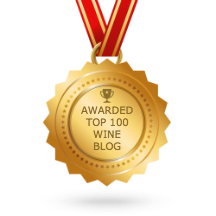white wine review is a lovely, dry Pinot Gris from the Awatere Valley in Marlborough that was featured as part of the thematic on wines from the Southern Hemisphere in last weekend's LCBO VINTAGES New Release Collection.
It is produced by Eradus Wines, a small, family-owned winery that was established by Har and Sophie Eradus, a couple who had emigrated from Holland in 1982 and grew flowers in Auckland. The couple embarked on a semi-retirement project in the 1990s and settled on an extraordinary footprint of land at the edge of the Awatere River, in the Awatere Valley of Marlborough, to grow grapes. At the time, this dryland was sheep country with only a few pioneering winegrowers.
The couple's connection to this land seemed fated when Sophie cleared a shed on the property and found an old potbelly door with an embossed logo that entwined their initials - "H", "S" and "E" - which inspired the Eradus logo. The couple's imagination was captured by this sliver of land that was nestled between a higher terrace and the glacial river below, with its guarding boundary of gnarled old macrocarpa cypress trees. From the beginning, Har and Sophie desired to have the unique and untameable terroir of the Awatere Valley express itself through their vines, grapes, and ultimately, the wines.
In 2004, Michiel, son of Har and Sophie, and his Kiwi wife, Hanna, took over the family business with a commitment to celebrating the unique terroir of this place. Their philosophy is based upon bending to nature and letting the Awatere Valley imprint itself upon every Eradus wine.
Eradus' piece of land has a unique mesoclimate that is truly cool-climate viticulture. To the east is the Pacific Ocean, a windswept stretch of blue which influences diurnal temperatures. To the south is towering Mount Tapuae-o-uenuku, while on the western horizon are sun-bleached high country hills. In between, on a sliver of terrace at the edge of a river, Eradus grows wines that encapsulate this extraordinary place. The windier nature of this area naturally protects their vines from disease. The area is also drier with a harsh sun, cool winds, and rocky soils that ensure small berries with concentrated flavours. The vine's roots dig deep into the rocky terrace, four metres above the mountain-fed Awatere River, to create wines of minerality and crisp, clean acidity.
Like other wines in the Eradus portfolio, including the lovely 2023 Eradus Pinot Noir I enjoyed last year, this white wine is also a single vineyard that was grown on the estate in the Awatere Valley. Crafted with 100% Pinot Gris from 19-year-old vines that are grown on a slender terrace at the edge of the Awatere River, on alluvial and river stone soils. With a unique microclimate and soil structure that is influenced by a fault line, a river, and the power of the nearby Pacific Ocean, their land is stony, dry, windy, and cool, elements which create wines of elegance and minerality with a lively and lingering finish.
The 2024 vintage in New Zealand is widely considered to be the best in living memory. The growing season began with unpredictable weather, including during budburst and flowering, but then settled down without any extreme weather. Summer was warm and dry, which created drought conditions for most of the country. However, temperatures during summer never got intensely hot, while autumn brought cooler weather, which helped cool the grapes and retain acidity and aromatics, and also extended the harvest season. Although yields were down in most of the country, the results were brilliant with clean and fresh fruit. From an exceptional vintage, let's see how this 2024 Pinot Gris from New Zealand is tasting tonight...
Enclosed by screw cap, this single vineyard Pinot Gris underwent fermentation and ageing in both stainless steel and barrel. Fresh, crisp, and clean medium-high intensity nose delivers ripe citrus, lemon pith, pear, stone fruits, white peach, and melon aromas with hints of leesy mineral. The medium+ bodied palate is dry with a lovely textural mouthfeel and flavours of zesty lemon citrus, pear, melon, and white peach alongside spice notes and touches of stony minerals. It has a fresh and zesty acidity, while citrus and grapefruit notes taper to savoury and stony minerals on the long, dry, crisp, and textured finish. Highly recommended buy! Score: 90 pts
One other wine by Eradus is readily available at the LCBO, while the full range can be ordered through their Agent - KOLONAKI Group of Companies.
It is produced by Eradus Wines, a small, family-owned winery that was established by Har and Sophie Eradus, a couple who had emigrated from Holland in 1982 and grew flowers in Auckland. The couple embarked on a semi-retirement project in the 1990s and settled on an extraordinary footprint of land at the edge of the Awatere River, in the Awatere Valley of Marlborough, to grow grapes. At the time, this dryland was sheep country with only a few pioneering winegrowers.
The couple's connection to this land seemed fated when Sophie cleared a shed on the property and found an old potbelly door with an embossed logo that entwined their initials - "H", "S" and "E" - which inspired the Eradus logo. The couple's imagination was captured by this sliver of land that was nestled between a higher terrace and the glacial river below, with its guarding boundary of gnarled old macrocarpa cypress trees. From the beginning, Har and Sophie desired to have the unique and untameable terroir of the Awatere Valley express itself through their vines, grapes, and ultimately, the wines.
In 2004, Michiel, son of Har and Sophie, and his Kiwi wife, Hanna, took over the family business with a commitment to celebrating the unique terroir of this place. Their philosophy is based upon bending to nature and letting the Awatere Valley imprint itself upon every Eradus wine.
Eradus' piece of land has a unique mesoclimate that is truly cool-climate viticulture. To the east is the Pacific Ocean, a windswept stretch of blue which influences diurnal temperatures. To the south is towering Mount Tapuae-o-uenuku, while on the western horizon are sun-bleached high country hills. In between, on a sliver of terrace at the edge of a river, Eradus grows wines that encapsulate this extraordinary place. The windier nature of this area naturally protects their vines from disease. The area is also drier with a harsh sun, cool winds, and rocky soils that ensure small berries with concentrated flavours. The vine's roots dig deep into the rocky terrace, four metres above the mountain-fed Awatere River, to create wines of minerality and crisp, clean acidity.
Like other wines in the Eradus portfolio, including the lovely 2023 Eradus Pinot Noir I enjoyed last year, this white wine is also a single vineyard that was grown on the estate in the Awatere Valley. Crafted with 100% Pinot Gris from 19-year-old vines that are grown on a slender terrace at the edge of the Awatere River, on alluvial and river stone soils. With a unique microclimate and soil structure that is influenced by a fault line, a river, and the power of the nearby Pacific Ocean, their land is stony, dry, windy, and cool, elements which create wines of elegance and minerality with a lively and lingering finish.
The 2024 vintage in New Zealand is widely considered to be the best in living memory. The growing season began with unpredictable weather, including during budburst and flowering, but then settled down without any extreme weather. Summer was warm and dry, which created drought conditions for most of the country. However, temperatures during summer never got intensely hot, while autumn brought cooler weather, which helped cool the grapes and retain acidity and aromatics, and also extended the harvest season. Although yields were down in most of the country, the results were brilliant with clean and fresh fruit. From an exceptional vintage, let's see how this 2024 Pinot Gris from New Zealand is tasting tonight...
Tasting Note:
ERADUS PINOT GRIS 2024 - Awatere Valley, Marlborough, South Island, New Zealand (#439000) (XD) - $21.95Enclosed by screw cap, this single vineyard Pinot Gris underwent fermentation and ageing in both stainless steel and barrel. Fresh, crisp, and clean medium-high intensity nose delivers ripe citrus, lemon pith, pear, stone fruits, white peach, and melon aromas with hints of leesy mineral. The medium+ bodied palate is dry with a lovely textural mouthfeel and flavours of zesty lemon citrus, pear, melon, and white peach alongside spice notes and touches of stony minerals. It has a fresh and zesty acidity, while citrus and grapefruit notes taper to savoury and stony minerals on the long, dry, crisp, and textured finish. Highly recommended buy! Score: 90 pts
One other wine by Eradus is readily available at the LCBO, while the full range can be ordered through their Agent - KOLONAKI Group of Companies.



























